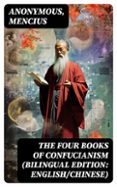Descargar THE FOUR BOOKS OF CONFUCIANISM
THE FOUR BOOKS OF CONFUCIANISM (BILINGUAL EDITION: ENGLISH/CHINESE) (edición en inglés) de ANONYMOUS, MENCIUS
- THE FOUR BOOKS OF CONFUCIANISM (BILINGUAL EDITION: ENGLISH/CHINESE) (edición en inglés)
- ANONYMOUS, MENCIUS
- Idioma: Inglés
- Formatos: pdf, ePub, MOBI, FB2
- ISBN: 8596547729341
- Editorial: Digicat
Overview
In The Four Books of Confucianism (Bilingual Edition: English/Chinese), readers are presented with a seminal collection that explores the vast expanse of Confucian thought, through a diverse array of literary styles from exposition to dialogue. This bilingual edition not only makes the foundational texts of Confucian philosophy accessible to a wider audience but also provides a unique opportunity to appreciate the subtleties of the original Chinese alongside its English translation. The anthology stands out for its comprehensive portrayal of Confucian ethics, politics, and philosophy, inviting readers into a millennia-old discourse on virtue, governance, and the moral constitution of the individual and society. The inclusion of works attributed to figures like Mencius adds layers of depth, illustrating the evolution and interpretation of Confucian thought across generations. The backgrounds of the ancient authors and editors, whose wisdom transcends the temporal bounds of their era, reflect a period rich in philosophical inquiry and societal transformation. Their contributions, rooted in the tumultuous Warring States period and beyond, offer invaluable insights into the development of Chinese intellectual and cultural identity. As a cornerstone of Eastern philosophy, this collection affirms the enduring relevance of Confucianism in navigating the complexities of modern life. Scholarly yet accessible, The Four Books of Confucianism is recommended for those seeking to enrich their understanding of philosophical thought and its practical applications to both personal growth and societal wellbeing. Through its bilingual presentation, the anthology encourages a deeper engagement with the texts, fostering a dialogue between past and present, and between Eastern and Western perspectives on ethics, governance, and the human condition.

